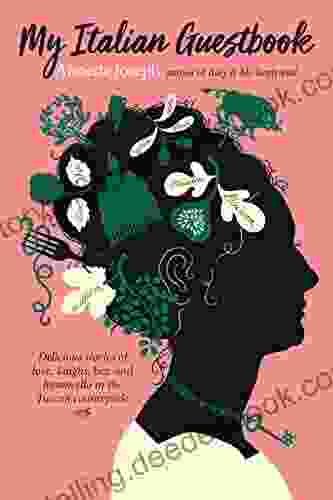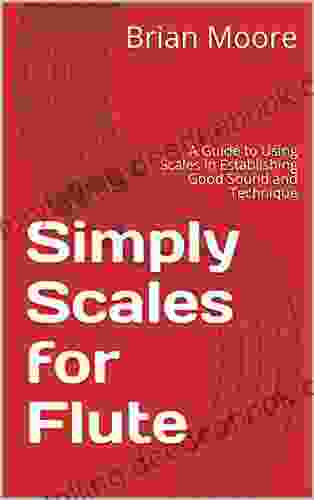The Ultimate Guide to Using Scales in Establishing Good Sound and Technique

Scales are a fundamental part of music theory and practice. They can help you improve your sound and technique on any instrument. This guide will teach you everything you need to know about scales, from the basics to more advanced concepts.
5 out of 5
| Language | : | English |
| File size | : | 1488 KB |
| Text-to-Speech | : | Enabled |
| Enhanced typesetting | : | Enabled |
| Word Wise | : | Enabled |
| Print length | : | 26 pages |
| Lending | : | Enabled |
| X-Ray for textbooks | : | Enabled |
| Screen Reader | : | Supported |
What are Scales?
Scales are a series of notes played in ascending or descending order. They are used to create melodies, harmonies, and chords. Scales can be major, minor, or pentatonic. Major scales are bright and cheerful, while minor scales are darker and more somber. Pentatonic scales are often used in folk and blues music.
Why are Scales Important?
Scales are important for a number of reasons:
- They help you learn the notes on your instrument. Scales are a great way to practice playing all the notes on your instrument. This will help you improve your finger dexterity and coordination.
- They help you improve your intonation. Scales can help you learn to play the notes in tune. This is essential for playing melodies and harmonies that sound good.
- They help you develop your improvisational skills. Scales can help you learn to improvise solos and melodies. This is a great way to express your creativity and individuality.
- They help you understand music theory. Scales are a fundamental part of music theory. Understanding scales will help you understand how music is constructed.
How to Practice Scales
The best way to practice scales is to use a metronome. This will help you keep a steady tempo and improve your timing. You should also practice scales in all keys. This will help you develop a well-rounded understanding of the fretboard or keyboard.
Here are some tips for practicing scales:
- Start slowly. Don't try to play scales too fast at first. Concentrate on playing the notes accurately and in time.
- Gradually increase your speed. As you become more comfortable playing scales, you can gradually increase your speed. However, always make sure to play the notes accurately.
- Practice in all keys. Don't just practice scales in the key of C. Practice them in all 12 keys. This will help you develop a well-rounded understanding of the fretboard or keyboard.
- Use a metronome. A metronome will help you keep a steady tempo and improve your timing.
- Be patient. It takes time to develop good scale technique. Don't get discouraged if you don't see results immediately. Just keep practicing and you will eventually reach your goals.
Advanced Scale Techniques
Once you have mastered the basics of scale playing, you can start to learn some more advanced techniques. These techniques can help you add variety and interest to your playing.
Some advanced scale techniques include:
- Double stops. Double stops are played by playing two notes at the same time. This can create a richer and more complex sound.
- Hammer-ons and pull-offs. Hammer-ons and pull-offs are techniques that allow you to play notes without picking them. This can create a smooth and fluid sound.
- Slides. Slides are played by sliding your finger from one note to another. This can create a smooth and expressive sound.
- Vibrato. Vibrato is a technique that involves slightly bending the pitch of a note. This can create a rich and expressive sound.
Scales are a fundamental part of music theory and practice. They can help you improve your sound and technique on any instrument. This guide has taught you everything you need to know about scales, from the basics to more advanced concepts. Now it's time to put what you've learned into practice. Start practicing scales today and you'll be on your way to becoming a better musician.
5 out of 5
| Language | : | English |
| File size | : | 1488 KB |
| Text-to-Speech | : | Enabled |
| Enhanced typesetting | : | Enabled |
| Word Wise | : | Enabled |
| Print length | : | 26 pages |
| Lending | : | Enabled |
| X-Ray for textbooks | : | Enabled |
| Screen Reader | : | Supported |
Do you want to contribute by writing guest posts on this blog?
Please contact us and send us a resume of previous articles that you have written.
 Book
Book Novel
Novel Chapter
Chapter Text
Text Reader
Reader Library
Library E-book
E-book Newspaper
Newspaper Paragraph
Paragraph Shelf
Shelf Bibliography
Bibliography Preface
Preface Annotation
Annotation Footnote
Footnote Manuscript
Manuscript Codex
Codex Tome
Tome Bestseller
Bestseller Classics
Classics Narrative
Narrative Reference
Reference Encyclopedia
Encyclopedia Thesaurus
Thesaurus Narrator
Narrator Character
Character Catalog
Catalog Card Catalog
Card Catalog Borrowing
Borrowing Stacks
Stacks Archives
Archives Periodicals
Periodicals Research
Research Lending
Lending Journals
Journals Rare Books
Rare Books Interlibrary
Interlibrary Literacy
Literacy Dissertation
Dissertation Storytelling
Storytelling Reading List
Reading List Mark Scott
Mark Scott Stuart Russell
Stuart Russell Jackie Bolen
Jackie Bolen Judy John Baptiste
Judy John Baptiste Jim Mcghee
Jim Mcghee Keith Wesley
Keith Wesley Dwight B Hinkel
Dwight B Hinkel Joanna Neil
Joanna Neil R Barri Flowers
R Barri Flowers Nikki Landis
Nikki Landis Daryl Gregory
Daryl Gregory Frank Erickson
Frank Erickson Chris Abernathy
Chris Abernathy Colin Wilson
Colin Wilson Kavus Torabi
Kavus Torabi Ron L Deal
Ron L Deal Samantha A Cole
Samantha A Cole Neil Mercer
Neil Mercer Robert Carpenter
Robert Carpenter Jan Ollis
Jan Ollis
Light bulbAdvertise smarter! Our strategic ad space ensures maximum exposure. Reserve your spot today!
 Juan RulfoFollow ·19.8k
Juan RulfoFollow ·19.8k Eric NelsonFollow ·7.3k
Eric NelsonFollow ·7.3k Eugene PowellFollow ·2.4k
Eugene PowellFollow ·2.4k Jimmy ButlerFollow ·5.4k
Jimmy ButlerFollow ·5.4k Albert ReedFollow ·7.4k
Albert ReedFollow ·7.4k Victor TurnerFollow ·9.1k
Victor TurnerFollow ·9.1k Corey HayesFollow ·7.6k
Corey HayesFollow ·7.6k Jack LondonFollow ·18.7k
Jack LondonFollow ·18.7k

 Howard Blair
Howard BlairClassical Music Themes for Easy Mandolin, Volume One
Classical Music Themes for Easy Mandolin,...

 Paulo Coelho
Paulo CoelhoThe Heretic Tomb: Unraveling the Mysteries of a Lost...
Synopsis In Simon Rose's captivating debut...

 Rodney Parker
Rodney ParkerThe Passionate Friends Annotated Wells: A Deeper...
Unveiling the...

 Ed Cooper
Ed CooperDelicious Stories of Love, Laughs, Lies, and Limoncello...
In the heart of...

 Elmer Powell
Elmer PowellHal Leonard Piano For Kids Songbook: Unleashing the...
Music holds immense...
5 out of 5
| Language | : | English |
| File size | : | 1488 KB |
| Text-to-Speech | : | Enabled |
| Enhanced typesetting | : | Enabled |
| Word Wise | : | Enabled |
| Print length | : | 26 pages |
| Lending | : | Enabled |
| X-Ray for textbooks | : | Enabled |
| Screen Reader | : | Supported |












